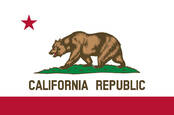This article is more than 1 year old
The ink's not dry on California'a new net neutrality law and the US govt is already suing
Ding-ding, round three in the internet access battle begins
Analysis Within minutes of California signing a net neutrality bill into law on Sunday, the US Department of Justice sued the state claiming the new legislation is illegal.
And so begins the latest bout in a battle over internet access that has been running for five years and is likely to last five more.
"In this action, the United States seeks a declaration invalidating and preliminarily and permanently enjoining the California Internet Consumer Protection and Net Neutrality Act of 2018, enacted through Senate Bill 822 (“SB-822”)," begins the federal government's complaint [PDF]. "SB-822 is preempted by federal law and therefore violates the Supremacy Clause of the United States Constitution."
SB822 had just been signed by Governor Jerry Brown on the last possible day. The law prohibits ISPs from blocking or slowing online content. It also makes it illegal for ISP to favor certain websites – or apps, or services – and from taking money to prioritize a specific company's content.
The legislation also bans "zero rating" – one area that has been in a legal gray area when it comes to net neutrality – which means that internet providers are not allowed to exempt certain services from data caps, something that typically applies to streamed music and video on mobile devices.
Despite the long run-up to the signing – including examples of Sacramento lobbying that highlighted the huge flaws in the American political process – the decision to sign SB822 into law was far from certain because, as even the bill's authors noted, it was going to be immediately challenged by large cable companies and likely the federal government, including federal regulator the FCC.
While cable company execs were presumably relaxing at home, the Justice Department couldn't wait and posted its complaint, complete with preliminary injunction request and press release, on a Sunday.
Extreme and illegal
It came complete with a quote from Attorney General Jeff Sessions: "Under the Constitution, states do not regulate interstate commerce – the federal government does. Once again the California legislature has enacted an extreme and illegal state law attempting to frustrate federal policy… We have a duty to defend the prerogatives of the federal government and protect our Constitutional order."
And, further emphasizing that fact that all of this has been expected for weeks, there is a quote from FCC chair Ajit Pai who helped kick off this latest fight by tearing up earlier rules. "I'm pleased the Department of Justice has filed this suit," Pai is quoted as saying. "The Internet is inherently an interstate information service. As such, only the federal government can set policy in this area."
While California governor Jerry Brown uncharacteristically failed to add a personal note about his signing – he often does with controversial and high-profile bills – the main author of SB822, Senator Scott Weiner was willing to weigh in.
"Within minutes of Governor Brown signing our net neutrality bill into law, Jeff Sessions came out of his cave and sued California to strike down the law," Weiner said in a statement. "Sessions and his boss Donald Trump aren’t satisfied with the federal government repealing net neutrality. In their world, *no one* is allowed to protect an open internet."
With a significant degree of inevitability, Monday morning has seen a steady stream of statements defending and decrying one or other side.
"Ajit Pai and Jeff Sessions want to attack net neutrality again? We say bring it on," bellowed advocacy group Fight for the Future. "We brought this bill back from the dead more than once and are ready to fight whatever comes next."
Conflicting
Telco trade group USTelecom complained that California was creating problems by going its own way: "Rather than 50 states stepping in with their own conflicting open internet solutions, we need Congress to step up with a national framework for the whole internet ecosystem and resolve this issue once and for all."
Democratic FCC Commissioner Jessica Rosenworcel was all for it: "A hefty thank you to the Golden State for your effort to get right what the FCC got wrong when it wiped out our open internet protections late last year."
Fellow commissioner, Republican Michael O'Rielly was dead set against: "California’s net neutrality effort reaffirms its leaders’ total lack of understanding of how technology or our economy actually works, particularly its ban on paid prioritization. If allowed to stand, the law would be incredibly detrimental to American consumers and the continued growth of the Internet."
These responses were entirely predictable. And, surprisingly, so are the legal arguments for and against the California law.
For almost a year, it has been made clear that the law will be challenged under the argument that internet access is an interstate service and so any rules at the federal level take precedence.
That argument has been so heavily forecast that an earlier effort to add net neutrality protections into Californian law were scrapped because they directly referenced federal rules.
In an effort to walk around that argument and prepare for the inevitable challenge, the new law writes the same rules into California law – rather than reference now-dead federal rules – and makes sure that the powers included in the law to punish companies have long been held as under a state's sole jurisdiction.
An old story
In essence, it will be another case in the long-running state versus federal battle that in many respects defines America.
Both sides claim that legal precedence. FCC chair Pai noted that the Eighth Circuit "recently reaffirmed that state regulation of information services is preempted by federal law" – an argument that is partly true though not as watertight as Pai would suggest.
Pai also argues that the law is illegal because it "hurts consumers" - a claim that because the law prohibits zero-rating, it is anti-consumer. Again, an argument that is half-true and will likely be subject to serious argument.
The FCC's O'Rielly has his own take on the law's legality. "This is precisely why our nation’s founding fathers crafted a Commerce Clause to the U.S. Constitution and why I pushed so hard for the Commission’s December action to include strong preemption provisions," he said.
On the other side, Senator Weiner pointed to a seemingly stronger case – that of a recent challenge by the Justice Department to California over immigration law. "We've been down this road before: when Trump and Sessions sued California and claimed we lacked the power to protect immigrants. California fought Trump and Sessions on their immigration lawsuits – California won – and California will fight this lawsuit as well," he argued on Monday.
Weiner's team has also been pushing the argument that because the FCC actively handed over its enforcement powers over internet access to the FTC that it "abdicated its responsibility."
"The FCC lacks the legal power to preempt states from protecting their resident and economy," claim Weiner's advisors.
So, what now?
So with most of the arguments already laid out, with the bill signed into law, and the DoJ champing at the bit to challenge it – what happens next?
Well, it will go through the California court system. The DoJ has sued in the Eastern District of California i.e. Sacramento. It will be defended by California Attorney General Xavier Becerra.
It seemed likely that the California courts will find against the DoJ lawsuit: Brown would not have signed the bill unless he thought there was an excellent chance it would be upheld by his own state's courts. But it is possible that the California courts will grant a preliminary injunction while the case is decided.
If California throws it out, the case will then be taken to the Supreme Court – a process that could take several years. And then the Supreme Court would have to decide whether to take it on. The Supreme Court has been pretty clear in the past in situations like these that it would much prefer that Congress create laws, rather that put it in the position of effectively deciding how to apply old, outdated laws.
So the Supreme Court could well refuse to hear the case, rather than wade into the increasingly impossible fight. Or it could decide in a very narrow area and tell Congress to come up with laws to cover the rest.
Pretty much everyone agrees that, following more than a decade of battles over how to fit internet access into existing telecoms laws, the real problem is that the internet is different to what has come before and needs new laws.
But with Congress so hopelessly deadlocked with partisan politics and with large cable companies having decided to play into that dynamic in order to get its way in this turn of the circle, it has become impossible to view net neutrality – and hence new telecoms legislation – in an objective, non-partisan way.
In short, just as this bill signing and legal challenge became foreseeable months ago, so it appears equally predictable that net neutrality will be pulled down into the pitched-hell that surrounds American debates over gun control and abortion.
What makes that reality that much stranger is that in the eyes of the American public, the issue is not a partisan one: there is overwhelming support for net neutrality across all political colors because if there is one thing that continues to bind Americans together it is their hatred of cable companies. ®


